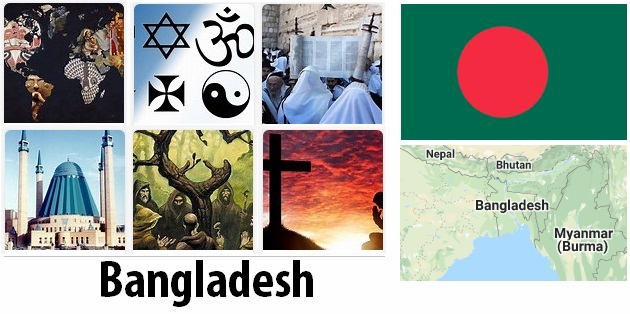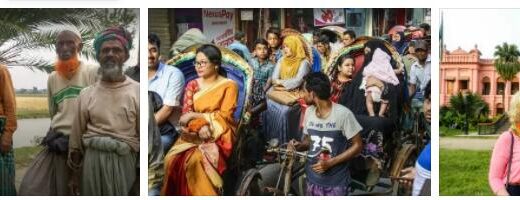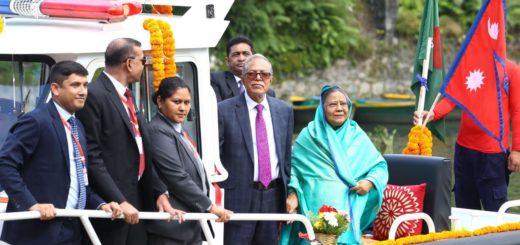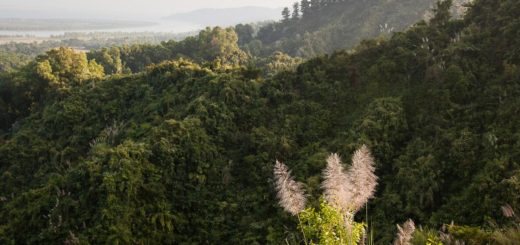Bangladesh Religion
Nearly nine out of ten residents profess Islam, the vast majority of them mainly Sunni. Among the others are most Hindus, but there are also some Buddhists, Christians and practitioners of animism (spirit and ancestral worship).
Bangladesh was founded as a secular (non-religious) state, but in 1988 Islam was adopted as a state religion. However, a constitutional supplement from 2011 states that secularism is once again “a cornerstone of the constitution”, at the same time as Islam is consolidated as an official religion (see Political system).
The Constitution has always guaranteed freedom of religion, and it has been largely respected by the state power. But Muslim fundamentalists have gained ground in recent years and occasionally harass Hindus, Shia Muslims and other groups who are considered blasphemous against the Sunni variant of Islam. Major political unrest in 2013 also led to increasing harassment and attacks directed against Hindus and Buddhists (see Current Policy). Muslim fundamentalists have in recent years also persecuted proponents of secularism, and several bloggers and other writers have been murdered for this reason (see Mass Media).
The Bangladeshi was formerly known for practicing a tolerant form of Islam. As the religion developed in the country from the 13th century onwards it was fairly separated from the dominant Islamic movements in the Indian peninsula. Therefore, Bangladeshi Islam has a distinctive character with influences from Hinduism and Buddhism. Sufism, Muslim mysticism that emphasizes the personal relationship between God and man, has also had a great influence.
- Countryaah: Population statistics for 2020 and next 30 years in Bangladesh, covering demographics, population graphs, and official data for growth rates, population density, and death rates.
Population composition
The Bengali make up 95% of the total population. Their language, Bengali, is one of the Indo-Aryan languages. Minorities in the state are ethnic groups shaped by Islam who have fled from Hindu India. Mongolian minorities live in the mountains.
Population distribution
Bangladesh is the most densely populated of all large states in the world. The population density is 865 residents per square kilometer. The country is slightly larger than Greece, but has more than ten times as many residents. The population grows by around 2% per year. The population distribution across the country is very different. The delta area of the Sundabarans and parts of the mountain landscapes are sparsely populated. Most of the people of Bangladesh live in rural settlements. The urbanization is increasing, approximately 14% of the population lives today already in the cities such as Chittagong and the capital Dhaka.
2020
May
The country opens up again
May 31st
The government ends the shutdown of the country that followed the corona pandemic. Despite the rapid spread of infection in Bangladesh, millions of people now return to their jobs in densely populated cities with often overcrowded transport systems. In a population of about 168 million residents, 47,151 confirmed cases of coronary infection were recorded and 650 deaths in covid-19 were recorded.
Emergency loans from the IMF
May 29th
The IMF grants an emergency loan of $ 732 million to Bangladesh. Corona pandemic has led to sharply reduced revenues from referrals and from the textile industry, while the state’s costs for health care and the distribution of food and cash grants to poor households have increased rapidly.
April
Textile factories reopened
April 27
Over 500 textile factories start their production after a month’s rest due to the corona pandemic. Employees in the factories are given stricter rules than usual for protective equipment and safety.
Sheikh Hasina’s father’s killer is hanged
April 10
Abdul Majed, a military commander who in 1998 was sentenced to death for the murder of Bangladeshi country father Sheikh Mujibur Rahman, is executed by hanging in a prison outside Dhaka. Majed was arrested a week earlier in Dhaka after fleeing for nearly 25 years. Sheikh Mujibur Rahman, the father of Prime Minister Sheikh Hasina, was murdered along with most of his family in connection with a military coup on August 15, 1975. Hasina and her sister were in Europe at the time of the assassination. Majed is believed to have moved to India in 1996 but returned to Bangladesh in March 2020.
Cox’s Bazar is isolated
April 8
Authorities decide to completely isolate Cox’s Bazar district, where over one million Rohingya refugees from Myanmar live in large camps. The measure is one of several that is being done to try to slow the spread of the new corona virus, which has caused a pandemic. Infection protection experts have warned that the infection can spread quickly in the overcrowded refugee camps where sewage is lacking and good hygiene is difficult to maintain. The decision means that no one can leave the camps and no one is allowed to go there. The ban also applies to 80 percent of aid workers. Only transport of food and medicines is allowed. In addition to the isolation of the refugee camps, there are state of emergency and nightly curfew in Bangladesh due to the pandemic.
March
Khaleda Zia temporarily released
24th of March
The government will release GDP leader Khaleda Zia from prison for the next six months so that she can receive care. Khaleda Zia faces a 10-year prison sentence for corruption. The opposition leader’s family has appealed to the government for Khaleda Zia to travel to London for care, but she is ordered to stay in Dhaka.
Death penalty for the murder of Hindu dead
March 15th
Four Islamist extremists are sentenced to death for the 2016 murder of a high-ranking Hindu religious leader. The brutal murder, when the man’s head was cut off, happened during a wave of violence against religious minorities in the country. The Islamic State (IS) took the deed, but authorities say the domestic group JMB (Jamayetul Mujahideen Bangladesh) was behind. JMB is accused of lying behind a wave of murders of secular writers and publishers, members of religious minorities and foreign nationals between 2013 and 2016. One of the worst attacks was targeted at a cafe in Dhaka in 2016 when 22 people were killed. Seven Islamic extremists were sentenced in November 2019 to death for that attack. About a tenth of Bangladesh’s population is Hindu.
January
Rohingya children are allowed to attend school
January 28
The government decides that 10,000 Rohingya refugee children under the age of 14 should attend the country’s regular school. Of the nearly one million Rohingya living in the country’s refugee camps, over half a million are children. Many came there during the military offensive in western Myanmar in the fall of 2017. The government of Dhaka has previously been negative about enrolling Rohingya children in schools, the children have instead received training in temporary centers run by the UN agency Unicef. Teaching in the Bangladeshi schools will start in April and is a collaborative project between the government and Unicef. The decision is welcomed by Rohingya representatives in the camps. They say that the measure reduces the risk of radicalizing refugee children.




